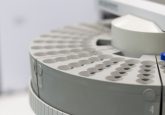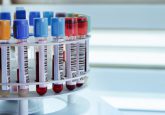Researchers develop a test for rapid diagnosis of sepsis

A collaborative team of researchers from Illinois (Il, USA) have developed a first of its kind device that can rapidly and reliably measure the immune systems response, allowing point-of-care diagnosis of sepsis from a drop of blood.
The study, published in Nature Communications outlined how the microfluidic chip device can estimate the number of leukocytes and quantify the levels of nCD64 (a protein biomarker that is associated with an immune response) from 10 μl of unprocessed blood.
The device that has completed a clinical study, has demonstrated its potential in identifying the onset of sepsis in addition to monitoring infected patients. Karen White, who led the clinical study (Carle Foundation Hospital; Il, USA) commented: “Sepsis is one of the most serious, life-threatening problems in the ICU. It can become deadly quickly, so a bedside test that can monitor patient’s inflammatory status in real time would help us treat it sooner with better accuracy.”
Currently, the life-threatening condition is diagnosed through the systemic inflammatory response syndrome criteria which involves monitoring a patient’s vital signs, such as blood pressure, oxygen levels and temperature, followed by a blood test that can take several days before a confirmed diagnosis. This results in a huge gap between diagnosis and treatment since the diagnostic process takes significantly longer than the progression of the disease. Therefore, having a test that can detect sepsis at the point-of-care, in approximately a minute, enables a response in time to prevent organ failure.
Lead researcher Rashid Bashir (University of Illinois; Il, USA) commented: “We are looking at the immune response, rather than focusing on identifying the source of the infection. One person’s immune system might respond differently from somebody else’s to the same infection. In some cases, the immune system will respond before the infection is detectable. This test can complement bacterial detection and identification. We think we need both approaches: detect the pathogen, but also monitor the immune response.”
“By measuring the CD64 and the white cell counts, we were able to correlate the diagnosis and progress of the patient – whether they were improving or not,” explained Umer Hassan (University of Illinois), first author of the study. “We hope that this technology will be able to not only diagnose the patient but also provide a prognosis. We have more work to do on that.”
The team hopes that the microfluidic chip can go on to incorporate the quantification for other inflammatory biomarkers. Bashir concluded: “We want to move the diagnosis point backward in time. The big challenge in sepsis is that no one knows when you get infected. Usually you go to the hospital when you already feel sick. So the goal is that someday you can be testing this at home, to detect infection even earlier if you can.”
Sources: Hassan U, Ghonge T, Reddy B et al. A point-of-care microfluidic biochip for quantification of CD64 expression from whole blood for sepsis stratification. Nat Commun. doi:10.1038/ncomms15949 (2017); https://phys.org/news/2017-07-quick-sepsis-blood.html





